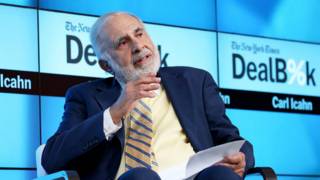 Image copyright Getty
Image copyright Getty
“Some become rich studying artificial intelligence. I make money studying human stupidity”.
So as defined in your Twitter account billionaire Carl Icahn, known as one of the most famous “investor-activists” of the world, who just announced his retirement from Apple due to its concern about the prospects of the company in China.
This is no small thing: at some point last year, Icahn has owned 53 million shares in Apple , about 1% of the total, a value that was around US $ 6,500 million.
Although the amount of the sale has not been revealed, reports indicate that earned about US $ 2,000 million for the transaction.
are hardly good news for the technology giant, whose financial results this week realized a 13% drop in profits was attributed to a decline in iPhone sales.
in the past, an announcement of purchase of shares by Icahn resulted in an immediate rise. Now, as might be expected, the reaction was downward. late on Thursday, had lost 3% of its value
But even more difficult to imagine the reaction of Tim Cook, Apple chief when Icahn released him the news that he was with his millions to another side.
“I called him this morning. he said he was sorry, obviously. But I told him it’s a great company ” said the investor.
China
it is not easy to assess the reasons for ICANH to withdraw from Apple.
according to what he told the US network CBS, concerned about the barriers that China can put trade in the products Apple
the country was one of the particularly weak points in the business performance of the company. there sales fell 26%.
“In China, for example, it will make it very difficult to sell Apple. They could, theoretically, you know … Basically, in a way they are, how to say, perhaps benevolent, but in a benevolent dictatorship. Although I do not know if ‘benevolent’ is the right word, “he said in the televised interview.
This month Beijing closed services movies and books from the Apple store in China, following the introduction of a law which requires that all content circulating in China is stored on servers within their territory.
These arguments outweighed their appreciation for the company, which began buying shares in 2013, and was a fan declared.
“in Apple today, in contrast to (what happened) six months or a year ago, there is no need for activism, because I think it has a very good management ” he said.
The investor activist
what do you mean “no need for activism”? Why call it “investor-activist”?
The answer has to do with how you engage with what they invest , rather than with their ideas about the situation of human rights in China, for example.
This New York businessman 80 years, 60 -after get started in business as a stockbroker on Wall Street in the years a title university in philosophically, developed a reputation as a ruthless “sharks” financial after the hostile takeover of several high profile companies.
Today is the majority shareholder Icahn Enterprises a <. i> holding business with a variety of interests, from mining to real estate, through technology
-
1978 it was the year that he began taking checkpoints in companies
-
2nd is the position of women in the Forbes list of the 40 owners of funds from richer world investment
-
US $ 2,000 million is the amount that would have earned from the sale of its shares in Apple
Getty
And part of its strategy to accumulate an estimated at US $ fortune 18.000 million has been have a belligerent attitude in companies in which it has participated .
in companies like Apple, Hertz or entertainment conglomerate Time Warner has used its right to vote at the shareholders meeting to press for that there are changes .
for example, in October last year urged the multinational insurance giant AIG to divide.
“you have not shown any signs of urgency and has chosen a strategy of ‘wait and see’ for years, empty of decisive leadership “, said in an open letter to the head of the company.
” it is obvious that the simple act of breaking the company greatly increase the shareholder value. “
if these examples do not make clear, the activism ICANH not fall into the same category that characterizes the non profit.
in fact, as argued by an article in the journal Time 2014, the label of “investor-activist” today is another name for the “sharks” . 80
So these activists are “good” or “bad”
the magazine responds quoted blogger James Kwak:
“In finance, rarely battles between good and evil occur. Instead, you have battles greedy and corrupt, say, versus greedy and ruthless “.
No comments:
Post a Comment